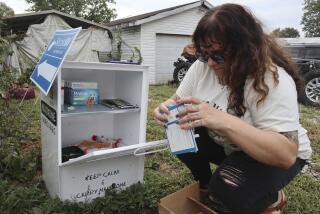A Needle, and a Life Saved
- Share via
So we’re in this alley in boyle heights--some volunteers and me and this nice lady who could be taking it easy at home in Beverly Hills, admiring the Chagall panels her husband just gave her for what seems hard to believe: her 75th birthday.
But no, she’s out here and she’s into it, standing between a car--its back seat covered with piles of drug-injection kits--and a table full of good advice printed in two languages about how, if you’re gonna be a fool anyway and shoot up, you should at least try to keep from getting AIDS and giving it to someone else, OK?
Overhead, slung from a wire, is a pair of graying sneakers, as recognizable in certain parts of town as the Golden Arches. It means “drugs sold here”--kind of ironic since no one has sold drugs here for months. Instead, once or twice a week--like the story of Aladdin, “new lamps for old!”--the city’s “harm-reduction program” hands out clean brand-new drug needles in exchange for old used ones.
A third of AIDS cases afflict IV drug users, and among women, nearly two-thirds get it from shooting up drugs or from having sex with men who do. Now the math: It costs about $119,000 to treat the typical AIDS case, and most of those people do not walk around with Blue Cross cards in their pockets. A clean needle costs a dime; a lifetime of clean needles, $4,000, tops.
But it wasn’t the pocketbook stuff that got to the lady with the Chagalls. Her name is Mimi West, and six years ago, as a new L.A. County commissioner on narcotics and dangerous drugs, she went to a workshop and heard a woman from a needle-exchange program in New York City say: “Every time I give out a clean needle, I think I’m saving a life.” “I still get goose bumps when I remember her saying that,” West says. And that’s why Mimi West is in this alley, among the junkies and the orange trees, to save a life, one needle at a time.
*
West has raised, I don’t know, millions of good-deed dollars, but you never see her sweating in front of a telethon tally board. She sweats behind the scenes. This is a woman whose college counselor told her in 1944 that girls didn’t go to law school--especially not poor girls. So she studied social work and later labored in the vineyards of community organization until she married stand-up comedian Bernie West, and together they didn’t know where the next month’s rent was coming from.
Bernie’s first steady job was in 1971; he came to L.A. to write five episodes for some show called “All in the Family.” Mimi had to drive him to work in their only car, and with her daughters away at school, she had all this time on her hands--and across the street was the L.A. Free Clinic.
After that meeting, neither she nor the free clinic was ever quite the same. The clinic had been so disorganized that it managed to lose money on a Joan Baez benefit concert. And here came West among the flower children. They were grimy and said words she’d never heard before, “but they were always so warm and wonderful, and, of course, I have children the same ages, and I think I was just kind of happy my kids had not gotten into the drug scene and that kind of thing.”
In 20-odd years multiplied by 40 hours a week, she organized volunteer cadres, raised money and hell and made the free clinic legit in the medical world, in Sacramento and at City Hall. Last year, Mimi and Bernie West gave half a million dollars to the clinic’s dental services. It was many zeros beyond the days when the clinic took in four or five donated bucks a night. The dental clinic pulled in twice that, and years later, West found out how: The volunteer passed the bucket in the waiting room and solemnly told the patients that there was only so much Novocain to go around.
*
In the alley, a too-thin man pulls four syringes out of a cigarette hard pack and drops them into a red plastic can. He gets four new ones in thin 29-gauge steel, a brown-bag sack of clean gear and health hints, and referrals to get detoxed. “I wanna tell you guys,” he says, “you’re doing a good job, man. You’re doing a good thing.”
In 1994, Los Angeles started putting up funds for needle-exchange programs, money that could be spent on all paraphernalia except the actual needles. L.A. County is still resisting, and West is nudging the five supes to endorse needle exchange in time to influence Health and Human Services Secretary Donna Shalala, because at the end of this month, the federal ban on funding needle exchanges ends, and Shalala can make sure that similar programs are offered nationwide.
This is one of those realities that pulls people both ways. Saving lives, good; saving money, good; but is it condoning junkies? West finds perplexing the belief that people will start mainlining heroin just because the needles are clean. It’s like believing that people will volunteer for a cell on Death Row because the food’s free.



